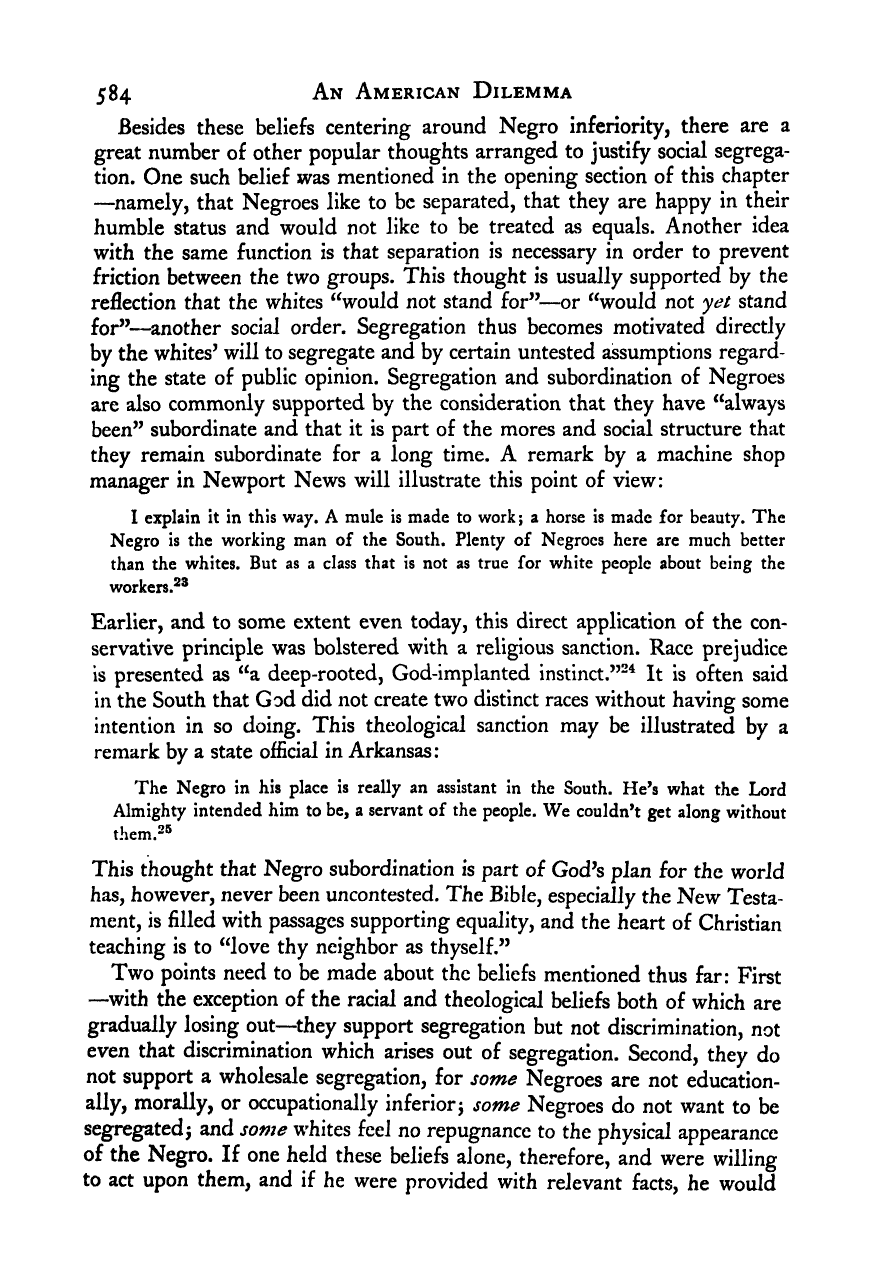Note: Gunnar Myrdal died in 1987, less than 70 years ago. Therefore, this work is protected by copyright, restricting your legal rights to reproduce it. However, you are welcome to view it on screen, as you do now. Read more about copyright.
Full resolution (TIFF) - On this page / på denna sida - VII. Social Inequality - 28. The Basis of Social Inequality - 5. Beliefs Supporting Social Inequality

<< prev. page << föreg. sida << >> nästa sida >> next page >>
Below is the raw OCR text
from the above scanned image.
Do you see an error? Proofread the page now!
Här nedan syns maskintolkade texten från faksimilbilden ovan.
Ser du något fel? Korrekturläs sidan nu!
This page has never been proofread. / Denna sida har aldrig korrekturlästs.
584 An American Dilemma
Besides these beliefs centering around Negro inferiority, there are a
great number of other popular thoughts arranged to justify social segrega-
tion. One such belief was mentioned in the opening section of this chapter
—namely, that Negroes like to be separated, that they are happy in their
humble status and would not like to be treated as equals. Another idea
with the same function is that separation is necessary in order to prevent
friction between the two groups. This thought is usually supported by the
reflection that the whites ‘Vould not stand for”—or ^Vould not yet stand
for”—another social order. Segregation thus becomes motivated directly
by the whites’ will to segregate and by certain untested assumptions regard-
ing the state of public opinion. Segregation and subordination of Negroes
are also commonly supported by the consideration that they have “always
been” subordinate and that it is part of the mores and social structure that
they remain subordinate for a long time. A remark by a machine shop
manager in Newport News will illustrate this point of view:
I explain it in this way. A mule is made to work; a horse is made for beauty. The
Negro is the working man of the South. Plenty of Negroes here are much better
than the whites. But as a class that is not as true for white people about being the
workers.^®
Earlier, and to some extent even today, this direct application of the con-
servative principle was bolstered with a religious sanction. Race prejudice
is presented as “a deep-rooted, God-implanted instinct.”-^ It is often said
in the South that God did not create two distinct races without having some
intention in so doing. This theological sanction may be illustrated by a
remark by a state official in Arkansas:
The Negro in his place is really an assistant in the South. He’s what the Lord
Almighty intended him to be, a servant of the people. We couldn’t get along without
them.-®
This thought that Negro subordination is part of God’s plan for the world
has, however, never been uncontested. The Bible, especially the New Testa-
ment, is filled with passages supporting equality, and the heart of Christian
teaching is to “love thy neighbor as thyself.”
Two points need to be made about the beliefs mentioned thus far: First
—with the exception of the racial and theological beliefs both of which are
gradually losing out—they support segregation but not discrimination, not
even that discrimination which arises out of segregation. Second, they do
not support a wholesale segregation, for some Negroes are not education-
ally, morally, or occupationally inferior j
some Negroes do not want to be
segregated 5
and some whites feel no repugnance to the physical appearance
of the Negro. If one held these beliefs alone, therefore, and were willing
to act upon them, and if he were provided with relevant facts, he would
<< prev. page << föreg. sida << >> nästa sida >> next page >>